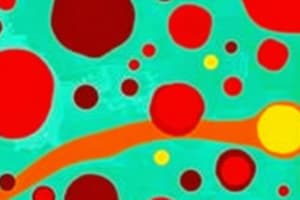Podcast
Questions and Answers
What is the purpose of the Coagglutination system using Staphylococcus aureus?
What is the purpose of the Coagglutination system using Staphylococcus aureus?
- To identify streptococci bacteria (correct)
- To determine the presence of rheumatoid factor
- To detect autoimmune hemolytic anemia
- To measure residual agglutinating particles in a specimen
What is the role of protein A in the Coagglutination reaction?
What is the role of protein A in the Coagglutination reaction?
- It adsorbs the FC portion of antibody molecules (correct)
- It bridges the distance between IgG cells
- It helps in washing cells after combination
- It reacts with red blood cells
Which test is known as the Coombs' test according to the text?
Which test is known as the Coombs' test according to the text?
- Antiglobulin-Mediated Agglutination (correct)
- Direct Antiglobulin Test
- Particle-counting immunoassay (PACIA)
- Indirect Antiglobulin Test
In which condition does the Direct Antiglobulin Test serve as an indicator?
In which condition does the Direct Antiglobulin Test serve as an indicator?
What may cause sources of error in antiglobulin testing according to the text?
What may cause sources of error in antiglobulin testing according to the text?
What is the main characteristic of agglutination?
What is the main characteristic of agglutination?
What did Gruber and Durham report in 1896?
What did Gruber and Durham report in 1896?
Which factor influences lattice formation in agglutination reactions?
Which factor influences lattice formation in agglutination reactions?
What enhance the process of lattice formation in agglutination reactions?
What enhance the process of lattice formation in agglutination reactions?
What is the purpose of passive agglutination in laboratory tests?
What is the purpose of passive agglutination in laboratory tests?
Flashcards are hidden until you start studying




